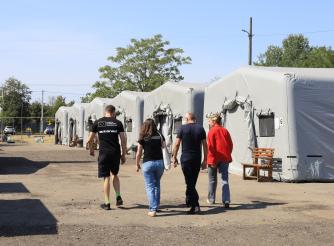“Many children are falling ill as a result of drinking this water: Amid extreme water shortages in Gaza, people forced to rely on unsafe, contaminated sources

Extreme water shortages are having a devastating impact on people’s health in Gaza, as people are forced to rely on contaminated and insect-infested sources. With water facilities destroyed or unable to function without fuel, and with little aid entering Gaza, obtaining water is a daily struggle. Mothers have told ActionAid of walking long distances and queueing for hours to try and get their children something to drink. Often, the only water available is polluted, which is making people sick with diarrhea and vomiting, increasing the risk of dehydration.
Zeina, a displaced woman in Gaza, told ActionAid: “We need to travel long distances to obtain water. The water we get is obviously polluted and yellow in colour. It’s also filled with bugs and insects. Many children are falling ill as a result of drinking this water. Many of my family members had diarrhea that lasted over a week due to the water pollution...Getting fresh drinking water is really difficult.”
Faiza, a mother displaced to central Gaza, said: “We get water with difficulty, as it is a very long distance away, and it is also unclean and undrinkable...[The water] causes my children to suffer from skin diseases and allergies...My son got jaundice, my brother too and most of the children in the area, due to the lack of hygiene and the scarcity of water...Our lives have become [only] queuing [for] salt water and [fresh] water.”
Over the last nine months, more than two-thirds (67%) of Gaza’s water and sanitation facilities -including wells, desalination plants and pipelines - have either been destroyed or damaged, WASH cluster partners estimate. Without fuel to power those still functioning, water production has plummeted, standing at just 26% of its pre-October 7 level as of June 2, according to UNOCHA.
People are struggling to survive without enough water to drink, let alone cover all their needs such as washing, cooking and cleaning. A recent assessment at a site for displaced people in Deir al-Balah found that people had just 0.7 litres of water available on average per person per day, when people need at least 15 litres to meet their needs in an emergency and a minimum of three litres to survive.
Ikhlas, a mother of four young children who has been displaced eight times and is currently sheltering in a school in central Gaza, said: “Water comes here three days a week. Due to the large number of displaced people in schools, we are forced to stand in line to [collect] water. The water is not [even] enough for drinking, so how do we meet the needs of the household such as washing, boiling, and feeding the children?”
Inhumane living conditions are further contributing to the spread of illness and disease. Most people are crammed into hugely overcrowded tents and shelters where, without water, staying clean is impossible. In many places rubbish is piling up in the streets and sewage is flowing between tents due to the lack of fuel to power wastewater and refuse facilities, leading to an increase in rats and insects. Current hot temperatures are making the situation even worse, and greatly increasing the risk of dehydration. Outbreaks of skin diseases and Hepatitis A are on the rise while, according to the WHO, cases of diarrhea have increased 25-fold as a result of the poor water quality and sanitation.
Karmel* is currently staying in a tent in a camp for displaced people in central Gaza. She said: “We suffer so much from the [lack of] water...There is no water to be able to bathe and clean our children. Also, we cannot wash the dishes, do the laundry, or do anything due to the [lack of] water... in the summer one needs a lot of water... Our children play in the streets all day long [as] we only have this tent to live in. When our children go out and come back in the evening, they need a bath...Our children sleep and wake up with an itch and lice [are spreading] widely due to the lack of water.”
Riham Jafari, Advocacy and Communications Coordinator at ActionAid Palestine said:
“Gaza is in the throes of a water crisis that is making every day a struggle, as people spend hours travelling or queueing to get something for their families to drink. With clean water so scarce, people have no option but to drink dirty water that is making them sick. There is no escape from the intense heat that is turning tents into greenhouses and greatly increasing the risk of dehydration.
“Exactly one month on from the ICJ ruling which ordered the Israeli authorities to ensure and facilitate unimpeded aid access into Gaza, the Rafah crossing remains closed and aid is still not entering Gaza at anything like the scale required. Every day more and more people are at risk of death from malnutrition and dehydration. Gaza needs more aid - including food, water, fuel and spare parts for critical water facilities - now. We reiterate our demand for a permanent and immediate ceasefire to put an end to this nine-month nightmare for good.”
Contact the ActionAid press office on uk.media@actionaid.org or on 07753 973 486.


